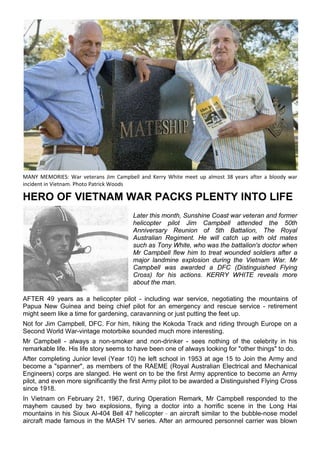
Sunshine Coast Sunday - 8 February 2015
- 1. MANY MEMORIES: War veterans Jim Campbell and Kerry White meet up almost 38 years after a bloody war incident in Vietnam. Photo Patrick Woods HERO OF VIETNAM WAR PACKS PLENTY INTO LIFE Later this month, Sunshine Coast war veteran and former helicopter pilot Jim Campbell attended the 50th Anniversary Reunion of 5th Battalion, The Royal Australian Regiment. He will catch up with old mates such as Tony White, who was the battalion's doctor when Mr Campbell flew him to treat wounded soldiers after a major landmine explosion during the Vietnam War. Mr Campbell was awarded a DFC (Distinguished Flying Cross) for his actions. KERRY WHITE reveals more about the man. AFTER 49 years as a helicopter pilot - including war service, negotiating the mountains of Papua New Guinea and being chief pilot for an emergency and rescue service - retirement might seem like a time for gardening, caravanning or just putting the feet up. Not for Jim Campbell, DFC. For him, hiking the Kokoda Track and riding through Europe on a Second World War-vintage motorbike sounded much more interesting. Mr Campbell - always a non-smoker and non-drinker - sees nothing of the celebrity in his remarkable life. His life story seems to have been one of always looking for "other things" to do. After completing Junior level (Year 10) he left school in 1953 at age 15 to Join the Army and become a "spanner", as members of the RAEME (Royal Australian Electrical and Mechanical Engineers) corps are slanged. He went on to be the first Army apprentice to become an Army pilot, and even more significantly the first Army pilot to be awarded a Distinguished Flying Cross since 1918. In Vietnam on February 21, 1967, during Operation Remark, Mr Campbell responded to the mayhem caused by two explosions, flying a doctor into a horrific scene in the Long Hai mountains in his Sioux Al-404 Bell 47 helicopter - an aircraft similar to the bubble-nose model aircraft made famous in the MASH TV series. After an armoured personnel carrier was blown
- 2. apart by a landmine, medics and others rushing to render aid were hit by another mine, result- ing in nine deaths and 22 wounded - a shattering day for B Company, 5 RAR. Mr Campbell's award citation reads: "At great personal risk Captain Campbell flew a medical officer to the scene of the mine explosions and landed in the minefield knowing full well that he and his helicopter could be destroyed by a mine explosion triggered by the helicopters skids or the down blast of the rotors. He chose to do this so that by quick evacuation the lives of the more seriously wounded might be saved. "With complete disregard for his own safety, Captain Campbell landed time after lime in the minefield In order to evacuate the wounded to another landing point from which it was considered safe for large Royal Australian Air Force helicopters to operate and thus remove the wounded to hospital. "By his skill, fortitude and special efforts to lift out the wounded at all costs, Captain Campbell set an out standing example as a soldier, as an Army pilot and his actions reflect great credit on himself, his unit and Army aviation." Mr Campbell recalled later: "I felt it was part of my Job and with little thought for the dangerous situation. I didn't hesitate to carry out the evacuations." Mr Campbell was serving as a mechanic with an Infantry battalion in Malaya when his potential to be a helicopter pilot was noticed lie had already gained a fixed-wing licence in his own lime and flying was a hobby. His first posting as an Army pilot was with a United Nations unit in Irian Jaya (now West New Guinea). Before being posted to Vietnam in 1966 he trained as an instructor in the US. After Vietnam he served in PNG and had another year in the US before resigning from the Army In 1979. One of his last "missions" with the Army was to fly the same Sioux Bell 47 he piloted in Vietnam, from the Army Aviation Centre at Oakey near Toowoomba to the Australian War Memorial in Canberra for display. Then he ended up in another pioneering role, becoming involved with establishing the Sunshine Coast Helicopter Rescue Service - believed to be Australia's longest running community-based, not-for-profit helicopter operation as both founding chief pilot and CEO. After retiring from flying in 2005 he took on two land-based adventures - the Kokoda Track and, at the age of 73, a trip to the Ukraine to buy a vintage motorbike and ride across part of Europe. "A group of 20 of us, mostly older males from a variety of backgrounds, arrived at a rundown workshop on a former Soviet airbase to collect the bikes." Mr Campbell recalls. "They were Russian-built copies of a World War Two German Army BMW bike with sidecar. Mine actually has a Swastika imprint on the chassis." He has made a few long trips with the bike back since, but mainly Just rides it around the Sunshine Coast, where he lives. At 75 he is a serious "outrigger", rowing annually in the national titles. He and wife Chris enjoy regular snow-skiing trips in Australia and New Zealand, as well as time with a son and two daughters and three grandchildren. Author Kerry White was a member of B Company, 5 RAR on that day when Mr Campbell won the DFC. He recalls seeing the helicopter come in to the site, but only in later years did he meet Jim Campbell and realise he was that pilot. Last year, Mr White published an anthology, the poet from hell, which includes a poem about the incident, "Carnival is over". Courtesy Sunshine Coast Sunday